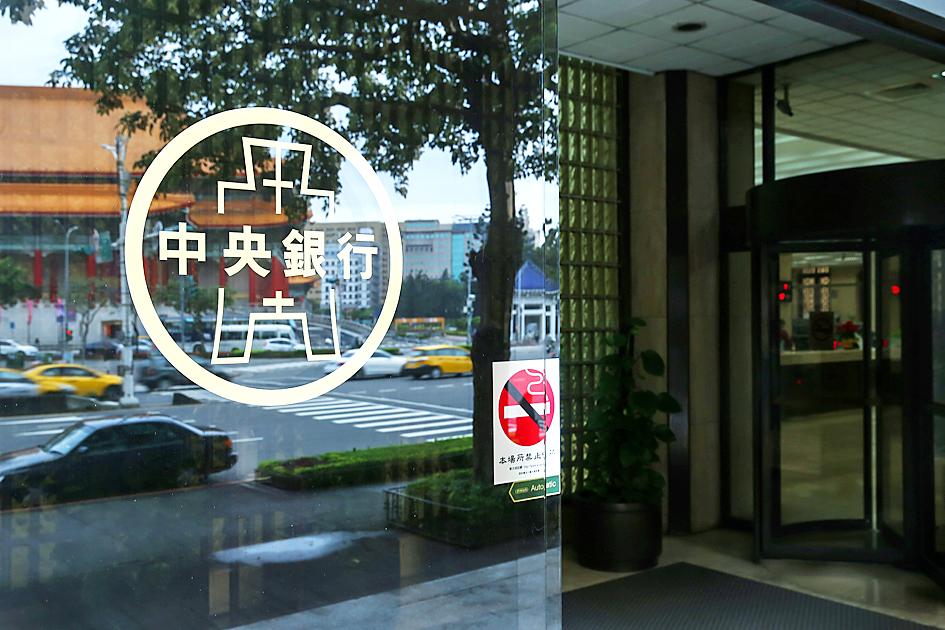The central bank has repeatedly called on the public and exporters to refrain from selling US dollars, but instead unite to help stabilize the New Taiwan dollar.
The nation’s top monetary policymaker early this week issued the pleas on Facebook, saying that as more of its global peers are using social media to convey their messages, it would follow suit.
Local companies should not take part in panic selling of the US dollar for fear that the greenback would depreciate further, the bank said in a post.

Photo: Billy H.C. Kwok, Bloomberg
It called the practice “suicidal,” saying that it would not only weaken the US dollar, but also harm corporate profitability.
A strong NT dollar has significantly eroded net income at DRAM chipmaker Nanya Technology Corp (南亞科技) and smartphone camera lens supplier Largan Precision Co (大立光), among other tech firms.
Taiwan Semiconductor Manufacturing Co (台積電) yesterday identified foreign-exchange risks as a factor that might affect its earnings, as it used an exchange rate higher than NT$28 versus the greenback in its revenue guidance for this quarter.
As of yesterday, the NT dollar had picked up 5.76 percent since late last year, next only to euro’s 8.33 percent advance and the yuan’s 7.74 percent gain during the same period, the central bank said.
Meanwhile, the won appreciated 5.32 percent, while the yen gathered 4.44 percent, over the same period.
“A stable exchange rate is favorable for all,” the central bank said in another post. “All participants can lend a helping hand in maintaining an orderly market.”
Ongoing foreign-exchange volatility has a lot to do with the practice of major global central banks printing more money, especially the US Federal Reserve, to support their economy, it said.

Taiwan’s rapidly aging population is fueling a sharp increase in homes occupied solely by elderly people, a trend that is reshaping the nation’s housing market and social fabric, real-estate brokers said yesterday. About 850,000 residences were occupied by elderly people in the first quarter, including 655,000 that housed only one resident, the Ministry of the Interior said. The figures have nearly doubled from a decade earlier, Great Home Realty Co (大家房屋) said, as people aged 65 and older now make up 20.8 percent of the population. “The so-called silver tsunami represents more than just a demographic shift — it could fundamentally redefine the

The US government on Wednesday sanctioned more than two dozen companies in China, Turkey and the United Arab Emirates, including offshoots of a US chip firm, accusing the businesses of providing illicit support to Iran’s military or proxies. The US Department of Commerce included two subsidiaries of US-based chip distributor Arrow Electronics Inc (艾睿電子) on its so-called entity list published on the federal register for facilitating purchases by Iran’s proxies of US tech. Arrow spokesman John Hourigan said that the subsidiaries have been operating in full compliance with US export control regulations and his company is discussing with the US Bureau of

Businesses across the global semiconductor supply chain are bracing themselves for disruptions from an escalating trade war, after China imposed curbs on rare earth mineral exports and the US responded with additional tariffs and restrictions on software sales to the Asian nation. China’s restrictions, the most targeted move yet to limit supplies of rare earth materials, represent the first major attempt by Beijing to exercise long-arm jurisdiction over foreign companies to target the semiconductor industry, threatening to stall the chips powering the artificial intelligence (AI) boom. They prompted US President Donald Trump on Friday to announce that he would impose an additional

Pegatron Corp (和碩), a key assembler of Apple Inc’s iPhones, on Thursday reported a 12.3 percent year-on-year decline in revenue for last quarter to NT$257.86 billion (US$8.44 billion), but it expects revenue to improve in the second half on traditional holiday demand. The fourth quarter is usually the peak season for its communications products, a company official said on condition of anonymity. As Apple released its new iPhone 17 series early last month, sales in the communications segment rose sequentially last month, the official said. Shipments to Apple have been stable and in line with earlier expectations, they said. Pegatron shipped 2.4 million notebook